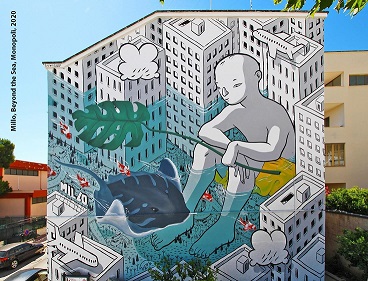Tra stereotipo e identità: lo sguardo di Theodor Wonja Michael sulla Germania del Novecento
DOI:
https://doi.org/10.54103/2035-7680/18688Keywords:
Post-colonialism; human zoos (Völkerschauen); identity; Theodor W. MichaelAbstract
The dynamics that rule the coexistence of people and cultural groups show that contemporary society is still bound by the prejudices of the past. Particularly problematic is the gap between those who, born and raised in Europe, are not accepted as part of the community because of their somatic traits that differ from the national model. This issue is analysed from the autobiographical book of Theodor Wonja Michael, a journalist and actor who lived under a spirit of resilience. His body, made vulnerable by the colour of his skin and by his Cameroonian heritage, could react on each occasion to the rejection of a Germany which, for years, demanded to speak in his place, forcing him to appear as a savage in the famous human zoos (Völkerschauen), in spite of his strong feeling of belonging to Germany. The historical events lead us to reflect on the principles governing the construction of the stereotypical image of ‘us’ and ‘the other’ and on the practical tools used to support these ideas. Deutsch sein und schwarz dazu (2015) tells the story of a man and, at the same time, of a group of individuals defrauded of their identities in order to embody the prejudices of the times.
Downloads
References
Austen, Ralph A. “Tradition, Invention and History: The Case of the Ngondo (Cameroon).” Cahiers d'Études Africaines, vol. 32, no. 126, pp. 285-309.
Bechhaus-Gerst, Marianne. Treu bis in den Tod: Von Deutsch-Ostafrika nach Sachsenhausen - Eine Lebensgeschichte. Christoph Links, 2007.
Bhabha, Homi K. The Location of Culture. Routledge, 2004.
---. “Of Mimicry and Man: The Ambivalence of Colonial Discourse.” October, vol. 28: Discipleship: A Special Issue on Psychoanalysis, 1984, pp.125-133.
Bruner, Jerome. “Self-making and world-making.” Narrative and Identity: Studies in Autobiography, Self and Culture, a cura di Jens Brockmeier, e Donal A. Carbaugh, John Benjamins, 2001, pp. 25-37.
Campt, Tina M. Other Germans: Black Germans and the Politics of Race, Gender, and Memory in the Third Reich. University of Michigan, 2005.
Droz, Bernard. Storia della decolonizzazione nel XX secolo. Tradotto da Ester Borgese, Bruno Mondadori, 2007.
El-Tayeb, Fatima. European Others: Queering Ethnicity in Postnational Europe. University of Minnesota Press, 2011.
Kraus, Wolfgang. “The quest for a third space: Heterotopic self-positioning and narrative identity.” Rethinking Narrative Identity: Persona and Perspective, a cura di Claudia Holler e Martin Klepper, John Benjamins, 2013, pp. 69-83.
Linne, Karsten. Deutschland jenseits des Äquators? Die NS-Kolonialplanungen für Afrika. Ch. Links, 2008.
McAdams, Dan P. “Narrative identity.” Handbook of identity theory and research, a cura di Seth J. Schwartz, et al., Springer, 2011, pp. 99-115.
Mees, Bernard. ”Hitler and Germanentum.” Journal of Contemporary History, vol. 39, no. 2: Understanding Nazi Germany, apr. 2004, pp. 255-270.
Michael, Theodor Wonja. Deutsch sein und schwarz dazu: Erinnerungen eines Afro-Deutschen. dtv, 2015.
---. “Das erste Jahrzehnt afrikanischer Unhabhängigkeit.” Afrika Bulletin, no. 1-2, gen. 1970, pp. 2-8.
Nadeem, Nahla. “Autobiographical narrative: An exploration of identity construction processes in relation to gender and race.” Narrative Inquiry, no. 25, dic. 2015, pp. 224-241.
Poliakov, Léon. Der arische Mythos. Zu den Quellen von Rassismus und Nationalismus. Tradotto da Margarete Venjakob, Junius, 1993.
Riesz, János. “Autor/innen aus dem schwarzafrikanischen Kulturraum.” Interkulturelle Literatur in Deutschland: Ein Handbuch, a cura di Carmine Chiellino, Metzler, 2007, pp. 248-262.
Rogowski, Christian. “The ‘Colonial Idea’ in Weimar Cinema.” German Colonialism, Visual Culture, and Modern Memory, a cura di Volker M. Langbehn, Routledge, pp. 221-238.
Ryan, William. Blaming the Victim. Vintage, 1976.
Said, Edward W. Orientalismo. Feltrinelli, 2016.
Schwarzrotgold TV. Theodor Wonja Michael, 1 ago 2015. https://www.youtube.com/watch?v=-sNjAGzPHkA. Consultato il 20 dic. 2021.
Von See, Klaus. Barbar, Germane, Arier: Die Suche nach der Identität der Deutschen. C. Winter, 1994.
Wildenthal, Lora. “Race, Gender, and Citizenship in the German Colonial Empire.” Tensions of Empire: Colonial Cultures in a Bourgeois World, a cura di Frederick Cooper e Ann L. Stoler, University of California, 1997, pp. 263-283.
Wilke, Sabine. Masochismus und Kolonialismus: Literatur, Film und Pädagogik. Stauffenburg, 2007.
Downloads
Published
How to Cite
Issue
Section
License

This work is licensed under a Creative Commons Attribution-NonCommercial-NoDerivatives 3.0 Unported License.




